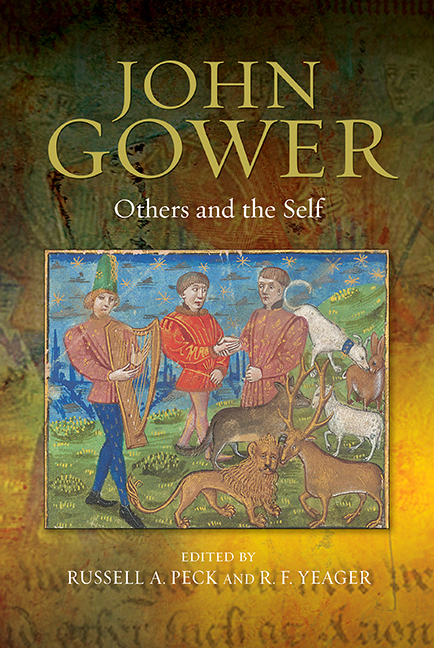Book contents
- Frontmatter
- Contents
- List of Illustrations
- Abbreviations
- Introduction
- PART I KNOWING THE SELF AND OTHERS
- 1 The Materiality of Cognition in Reading, Staging, and Regulation of Brain and Heart Activities in Gower's Confessio Amantis
- 2 The Sound of My Voice: Aurality and Credible Faith in the Vox Clamantis
- 3 “Noght withoute peine”: Chastity, Complaint, and Lucrece's Vox Clamantis
- 4 Reading Faces in Gower and Chaucer
- 5 Gower and Mortality: The Ends of Storytelling
- PART II THE ESSENCE OF STRANGERS
- PART III SOCIAL ETHICS, ETHICAL POETICS
- Bibliography
- Index
- VOLUMES ALREADY PUBLISHED
5 - Gower and Mortality: The Ends of Storytelling
from PART I - KNOWING THE SELF AND OTHERS
Published online by Cambridge University Press: 30 April 2019
- Frontmatter
- Contents
- List of Illustrations
- Abbreviations
- Introduction
- PART I KNOWING THE SELF AND OTHERS
- 1 The Materiality of Cognition in Reading, Staging, and Regulation of Brain and Heart Activities in Gower's Confessio Amantis
- 2 The Sound of My Voice: Aurality and Credible Faith in the Vox Clamantis
- 3 “Noght withoute peine”: Chastity, Complaint, and Lucrece's Vox Clamantis
- 4 Reading Faces in Gower and Chaucer
- 5 Gower and Mortality: The Ends of Storytelling
- PART II THE ESSENCE OF STRANGERS
- PART III SOCIAL ETHICS, ETHICAL POETICS
- Bibliography
- Index
- VOLUMES ALREADY PUBLISHED
Summary
Gower is the only medieval English author of whom we have a tomb effigy. The tomb erected (and possibly recycled) for Chaucer in the 1550s once had a portrait of him, engraved or perhaps painted on its rear wall tablet, but that has long since gone. Gower lies in splendor with his head resting on the three volumes of his works, watched over by the virtues, and recently repainted in vivid gloss, in what was once the priory church of St. Mary Overy and is now Southwark Cathedral. Between those two incarnations, it was St. Saviour's, the parish church of the Globe Theatre, where Shakespeare's younger brother is buried; and it may perhaps have been Shakespeare's familiarity with the tomb, as well as his familiarity with a widely known story, that encouraged him to turn to Gower as the inspiration for and the presenter of Pericles. The tomb presumably represents the form in which the poet himself wished to be remembered, his works outliving the mortal body represented in the effigy. Gower was a man who thought about mortality; and he did so most evidently, not at the ends of his more overtly religious or moralizing works, but at the end of the Confessio Amantis, in that moment when we are required to rethink all that as readers we thought we knew. When the lover's confession is complete and all the tales are told, the narrator encounters Venus. She asks his name; and he answers, “John Gower.” It is a crucial moment analogous to Beatrice's naming of Dante––a moment of total self-knowledge, though with the opposite import, not about salvation, but about death. For she follows that up with a brutal reminder of his own mortality: “Remembre wel hou thou art old.” It is now one of the most famous lines in the whole poem; but in context, it is an extraordinary statement, because it is completely unexpected, by both lover and readers, and the shock it delivers is enough to knock him unconscious. It may not do that to the readers; but it still has a powerful effect, and not just in narrative terms, in the discovery that this is not a typically young lover, as one had assumed.
- Type
- Chapter
- Information
- John Gower: Others and the Self , pp. 91 - 108Publisher: Boydell & BrewerPrint publication year: 2017

